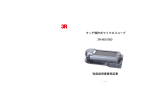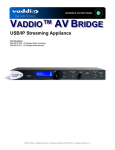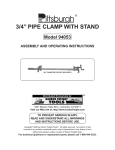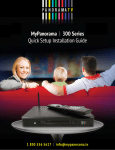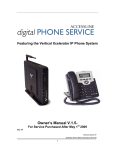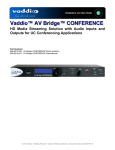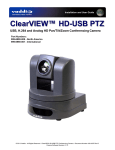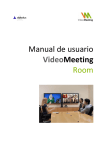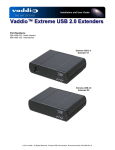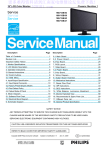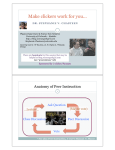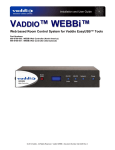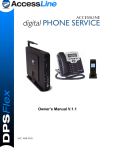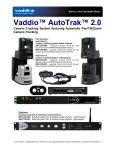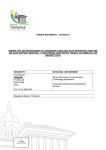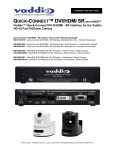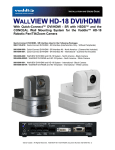Download VADDIO™ AV B
Transcript
Installation and User Guide VADDIO™ AV BRIDGE USB/IP Streaming Appliance Part Numbers: 999-8210-000: AV Bridge (North America) 999-8210-001: AV Bridge (International) © 2012 Vaddio - All Rights Reserved. Document Number 342-0518 Rev C Toll Free: 800-572-2011 ▪ Phone: 763-971-4400 ▪ FAX: 763-971-4464 ▪ vaddio.com AV Bridge Inside Front Cover - Blank Vaddio AV Bridge - Document Number 342-0518 Rev C Page 2 of 36 AV Bridge Table of Contents Overview: ................................................................................................................................................................................................................ 4 Save These Instructions: .................................................................................................................................................................................... 4 Unpacking: .............................................................................................................................................................................................................. 5 Anatomy of the AV Bridge ....................................................................................................................................................................................... 5 Image: Front Panel with Feature Callouts ..................................................................................................................................................... 5 Image: Rear Panel Connector and Features ................................................................................................................................................ 6 First Time Set-up with the AV Bridge: ..................................................................................................................................................................... 6 Diagram: The simple way to look at AV Bridge ............................................................................................................................................. 7 Diagram: A small Lecture Capture System ................................................................................................................................................... 7 Installation Instructions:........................................................................................................................................................................................... 8 Diagram: Connecting the AV Bridge ............................................................................................................................................................. 8 Step by Step Installation Instructions: ................................................................................................................................................................ 8 Compatibility............................................................................................................................................................................................................ 9 Table: Supported UVC Resolutions .............................................................................................................................................................. 9 System Configuration and Programming: ............................................................................................................................................................. 10 Web Pages Tour: .................................................................................................................................................................................................. 11 Screen Shot: Login...................................................................................................................................................................................... 11 Screen Shot: A/V Configuration Web Page ................................................................................................................................................ 12 Screen Shot: AV Configuration .................................................................................................................................................................... 12 Screen Shot: Streaming .............................................................................................................................................................................. 13 Screen Shot: Room Labels ......................................................................................................................................................................... 14 Screen Shot: Network Configuration - DHCP ............................................................................................................................................. 14 Screen Shot: Network Configuration - Static IP .......................................................................................................................................... 15 Screen Shot: Security ................................................................................................................................................................................. 15 Screen Shot: Diagnostics ............................................................................................................................................................................ 16 Screen Shot: System Menu ........................................................................................................................................................................ 16 Screen Shot: System Confirmation Messages ........................................................................................................................................... 17 Screen Shot: Firmware Update in Progress ............................................................................................................................................... 17 Screen Shot: Help Menu ............................................................................................................................................................................. 18 Logout: ......................................................................................................................................................................................................... 18 Updating AV Bridge Firmware............................................................................................................................................................................... 19 Restoring Factory Defaults ............................................................................................................................................................................... 20 Warranty Information............................................................................................................................................................................................. 21 AV Bridge Compliance and CE Declaration of Conformity ................................................................................................................................... 22 General Specifications .......................................................................................................................................................................................... 23 Appendix 1- Connectors Pin Outs ......................................................................................................................................................................... 23 Appendix 2: Vaddio Serial Command API ........................................................................................................................................................... 24 Command List: ...................................................................................................................................................................................................... 25 Release Notes - AV Bridge 2.0.0 .......................................................................................................................................................................... 32 New Features & Functions ........................................................................................................................................................................... 32 Fixed Issues ................................................................................................................................................................................................. 32 Known Issues ............................................................................................................................................................................................... 32 Interoperability Testing & Findings ................................................................................................................................................................... 32 Table: AV Bridge UC Client Interoperability Testing ................................................................................................................................... 32 Table: AV Bridge IP Streaming Interoperability Testing .............................................................................................................................. 33 Previous Release Notes(1.2.0): ............................................................................................................................................................................ 34 Interoperability Testing & Findings: ....................................................................................................................................................................... 35 Vaddio AV Bridge - Document Number 342-0518 Rev C Page 3 of 36 AV Bridge Overview: Vaddio’s AV Bridge is a room based HD Media Streaming appliance for USB and IP streaming of content originating from traditional audio and video equipment. The AV Bridge is designed for pro AV applications offering a flexible audio and video interface that’s controllable from an embedded web server or front panel menu. A/V Bridge accepts a multitude of video input resolutions from standard definition (480i/NTSC and 576i/PAL) up to HD 1080p/60 in HDMI and YPbPr, including wide-screen VESA type resolutions (RGBHV) and incorporates stereo audio inputs facilitating connection to professional AV equipment. AV Bridge shown with provided Rack Ears Attached The USB streaming functions using MJPEG (Motion JPEG) and standard UVC (USB Video Class) with UAC (USB Audio Class) drivers eliminating the need for installation of custom software drivers on the Host PC. The IP streaming uses RTSP and HLS (Apple’s variant on HTTP streaming) and encodes H.264 video with AAC Audio. The Ethernet port also provides access to internal web pages for control, set-up and updating the AV Bridge. Use the AV Bridge in lecture/capture recording applications to “bridge” video and audio signals into a PC for storage, editing, rebroadcasting meetings or worship services and retrofit existing meeting rooms by simply plugging a USB cable into a Host PC or connecting to an IP network. The AV Bridge supports high definition encoding of audio and video sources, producing superior quality results at the fraction of the cost of other products. The AV Bridge seamlessly integrates with Vaddio’s HD cameras, presentation systems, video mixing consoles and audio products. The AV Bridge is an unsurpassable value because of its ease of use and plug and play functionality. Intended Use: Before operating the device, please read the entire manual thoroughly. The system was designed, built and tested for use indoors, and with the provided power supply and cabling. The use of a power supply other than the one provided or outdoor operation has not been tested and could damage the device and/or create a potentially unsafe operating condition. Important Safeguards: Read and understand all instructions before using. Do not operate any device if it has been dropped or damaged. In this case, a Vaddio technician must examine the product before operating. To reduce the risk of electric shock, do not immerse in water or other liquids and avoid extremely humid conditions. Do not connect Power over Ethernet (PoE) cables directly to the RJ-45 ports on the device as damage may result. Use only the power supply provided with the system. Use of any unauthorized power supply will void any and all warranties. Please do not use “pass-thru” type RJ-45 connectors. These pass-thru type connectors do not work well for professional installations and can be the cause of intermittent connections which can result in the RS-232 control line failing and locking up. For best results please use standard RJ-45 connectors and test all cables for proper pin-outs prior to use. Save These Instructions: The information contained in this manual will help you install and operate your product. If these instructions are misplaced, Vaddio keeps copies of Specifications, Installation and User Guides and most pertinent product drawings for the Vaddio product line on the Vaddio website. These documents can be downloaded from www.vaddio.com free of charge. Vaddio AV Bridge - Document Number 342-0518 Rev C Page 4 of 36 AV Bridge Unpacking: Carefully remove the device and all of the parts from the packaging. Unpack and identify the following parts: AV Bridge shown with provided Rack Ears Attached For P/N 999-8510-000 AV Bridge for North America One (1) AV Bridge HD Audio/Video Encoder One (1) Pair of Rack Ears One (1) 18 VDC, 2.75 Amp Switching Power Supply with AC Power Cord for North America One (1) 6’ (1.83m) USB 2.0 Cable, Type-A Male to Type-B Male (black) One (1) Set of four rubber feet for bottom of enclosure (if not racked) One (1) Install Guide and User Manual For P/N 999-8510-000 AV Bridge for International One (1) AV Bridge HD Audio/Video Encoder One (1) Pair of Rack Ears One (1) 18 VDC, 2.75 Amp Switching Power Supply One (1) Euro Power Cord One (1) UK Power Cord One (1) 6’ (1.83m) USB 2.0 Cable, Type-A Male to Type-B Male (black) One (1) Set of four rubber feet for bottom of enclosure (if not racked) One (1) Install Guide and User Manual Anatomy of the AV Bridge Image: Front Panel with Feature Callouts AV Bridge shown without Rack Ears Attached ➊ ➋ ➌ ➍ ➎ ➏ ➐ 1) Video Input Detect: Blue LED indicator will illuminate validating that an active video input source has been detected by AV Bridge. 2) LCD Display: LCD display for menu system - displays configuration information. 3) Menu Navigation Controls: Rotary navigation knob to access menu items and information on LCD display. Also includes Selection and Cancel buttons for user interface of system menu. 4) Mute Controls: Video mute button stops streaming video to USB and injects color bar image. Audio mute button stops audio from being sent on USB record channel. 5) Audio Level Controls: Rotary encoder knob to adjust audio input level being sent to USB record channel. Functions as the master volume control for both left and right input channels. Volume increases by rotating clockwise and decreases by rotating counterclockwise. 6) Power/Reset Button: System reset for the A/V Bridge. 7) Input LED Indicators: Depicts the current video (HDMI, HD, or SD) and audio input selection and signal characteristics - Unbalanced (High-Z) or Balanced (Low-Z). Vaddio AV Bridge - Document Number 342-0518 Rev C Page 5 of 36 AV Bridge Image: Rear Panel Connector and Features 18 VDC ➊ ➋ ➌ ➍ ➎ ➏ ➐ 1) Power Connector: 5.5mm OD x 2.5mm ID, center positive coaxial connector for supplying power to the device. Use with provided desktop 18 VDC, 2.75 Amp power supply. 2) DIP Switches: Used to reset device to factory defaults. Setting all DIP switches to the off-position will reset the unit to factory defaults on the next power cycle. User will lose all programmed configurations on the factory default operation. 3) RS-232: RS-232 communication port on an RJ-45 connector supporting Vaddio’s serial command protocol. Used for interfacing with AMX/Crestron control systems. 4) USB Port: USB Type B connector for interface to the Host PC. Emulates a Webcam and an audio record device. 5) Network: 10/100 Ethernet with embedded web server for configuration and management of the AV bridge. This port will stream H.264 and AAC audio. 6) Video Inputs: Video inputs supporting HDMI, HD or SD connections. The HD connection supports either YPbPr or select wide screen RGBHV resolutions on the DE-15 connector. Video sources can be switched live during a USB streaming session. 7) Audio Inputs: Stereo balanced +4dBu audio on XLR connectors and stereo unbalanced -10dBV on RCA connectors. The audio inputs are line level and user selectable between balanced or unbalanced. First Time Set-up with the AV Bridge: The AV Bridge is a complex high definition Audio/Video encoder used as a USB or IP streaming appliance that provides a Plug & Play type interface (or bridge) between traditional A/V room equipment and a Host PC. The AV Bridge facilitates the use of PC-Based lecture/capture, recording, editing, distribution or Unified Communications (UC) software within group meeting spaces. It is important to note that the audio and video can work together as inputs to the AV Bridge or can be used separately depending on the requirements of the installation. The AV Bridge is easy and fun to operate, even the part time volunteer’s at the local House of Worship will have no problem understanding how the AV Bridge works and how to set it up. The applications below depict common room applications that can be supported with the AV Bridge. Vaddio AV Bridge - Document Number 342-0518 Rev C Page 6 of 36 AV Bridge Diagram: The simple way to look at AV Bridge The AV Bridge “bridges” the A/V signals into the PC for applications like lecture capture, storage for later playback, editing, distribution and other programs that can manipulate the content that the AV Bridge provides. Cessna 172 (not included) Bridge (It’s a Metaphor) USB 2.0 Out STD UVC & UAC Drivers HD Video A/V Sources to INPUT of Bridge PC Audio Diagram: A small Lecture Capture System This system uses an HD-19 PTZ camera, EasyTalk™ Wireless Lav System, the AV Bridge to encode the A/V signals to USB 2.0 for use with the User’s PC and Lecture Capture software. Vaddio HD-19 Classroom Camera PANOPTO Lecture Capture Software Package HD Video Instructor’s Wireless Lav Mic and Belt Pack AV Bridge with USB 2.0 Output using Standard UVC and UAC drivers HD Video No special drivers needed USB 2.0 Out STD UVC & UAC Drivers HD Balanced Audio Vaddio EasyTalk Wireless Lavalier Mic System With rechargeable Belt Pack for the Instructor Vaddio AV Bridge - Document Number 342-0518 Rev C PC and PANOPTO Lecture Capture Software Page 7 of 36 AV Bridge Installation Instructions To install the AV Bridge, follow the steps below to attach various pieces of equipment. Diagram: Connecting the AV Bridge Audio Level Indicator on LCD Display AV Bridge Menu Power Supply RS-232 USB 2.0 Audio & Video HD Video Program Bus 1080p/60 Host PC with Recording & Editing Software Cool Mics Balanced Audio Low-Z (+4 dBV) Ethernet Vaddio ProductionVIEW™ HD Optional Control System PowerVIEW™ HD Cameras AV Bridge Front Panel Cat-5e Audio Mixer PC with approved/tested browser controlling the AV Bridge though the embedded web pages. Step by Step Installation Instructions: Step 1: Plug in the 18VDC, 2.75 Amp power supply included with the AV Bridge package. The front panel LCD display will illuminate blue when the power is applied. The menu is now active and ready for configuration. Step 2: Connect the Video Content Source(s) to the AV Bridge for USB 2.0 Streaming. More than one source can be attached and selected from the front panel or web page menu. In this case a ProductionVIEW HD with HD-22 Cameras is connected to the HD-YPbPr input. Step 3: Connect the Audio Content Source(s) to the AV Bridge. In this case, a mixer and really good mics are connected using the balanced audio inputs. Step 4: Connect the Host PC to the AV Bridge with the provided USB 2.0 Type-A Male to Type-B Male cable. -ORStep 5: For IP streaming and control, connect the AV Bridge to the LAN which will allow set-up, configuration and control of the AV Bridge via the internal web pages in AV Bridge from any of the approved browsers. Step 6: From the front panel Menu System (Large Knob, Select and Cancel button), in this example, select the balanced audio input, and select HD-YPbPr video input that are to be streamed. Note: The AV Bridge will use DHCP (by default) to obtain an IP address when connected to the LAN. The IP address will be viewable on the front panel menu. In absence of a DHCP server, the AV Bridge will default to a Static IP address which is 169.254.1.1 Vaddio AV Bridge - Document Number 342-0518 Rev C Page 8 of 36 AV Bridge Compatibility The AV-Bridge will work with the following web browsers, soft codecs, computer operating systems and media players: Compatibility: Web Browsers: 1) 2) 3) 4) 5) Internet Explorer (IE 8 and above) Safari (Rev 4 and 5) Safari/iOS (Rev 4 and 5) Chrome (the latest and current release - auto updating) Firefox (the latest and current release - auto updating) Soft Clients Compatibility: AV Bridge Release 2.0.x is compatible with the following soft codecs or applications, in no particular order (see Release notes for versions tested): 1) 2) 3) 4) 5) 6) 7) 8) 9) 10) 11) Skype Web Ex (WBS 28.7 and up) Microsoft Lync Cisco Jabber Vidyo Desktop Google Plus Adobe Connect 8 LifeSize ClearSea GoToMeeting (Citrix) Polycom M100 Panaopto (lecture capture) Win 7 & Mac OS X (10.7) Win 7 & Mac OS X Win7 Win 7 & Mac OS X Win 7 & Mac OS X Win 7 Win 7 & Mac OS X Win 7 Win 7 & Mac OS X Win7 Win 7 Compatibility: Media Players: The UVC with MJPEG and IP with H.264 video are compatible with the industry leading PC media players. Quick-Time 10.2 VLC Media Player 2.0.4 Real Player 16.0 Compatibility: Operating Systems Apple OS X (10.7 and above) Windows XP w/Service Pack 3 with known issues and errata Windows 7 Linux Evolving Compatibilities: As more UC soft-client and lecture capture programs are released and gain popularity, Vaddio will provide a continuing research and development effort to ensure the compatibility with other manufacturer’s products. USB 2.0 The USB 2.0 UVC (Universal Video Class) video driver resolution table is an internal list of resolutions available for the Host PC and the AV Bridge to negotiate and use for any specific application. Typically, the highest resolution possible between both the PC and AV Bridge is used. However, not all OS and application combinations are typical. Some applications are assigned to a lower value, or the lowest resolution to purposely minimize the bandwidth requirement. In order to avoid selection of the smallest resolution possible, the resolutions of 160 x 120 and 160 x 90 were removed due to the selection of the lowest resolution by some UC Clients and because it looked sort of wicked awful (in some respects). Table: Supported UVC Resolutions Format Resolution MJPEG 1280 x 720 960 x 544 704 x 576 640 x 480 640 x 360 424 x 240 352 x 240 320 x 240 320 x 180 Vaddio AV Bridge - Document Number 342-0518 Rev C Frame Rate 15/30 15/30 15/30 15/30 15/30 15/30 15/30 15/30 15/30 Aspect Ratio 16:9 16:9 4:3 4:3 16:9 4:3 4:3 4:3 16:9 Page 9 of 36 AV Bridge System Configuration and Programming: Front Panel Menu The front panel menu system allows some basic configuration of the AV Bridge and serves to display the important system parameters and settings. The menu tree is depicted below: > Start Page: Initializing and Audio Ladder Appear > Main Menu > Audio Inputs (Selectable from front panel) > Balanced (Low Z) > Unbalanced (High Z) > Video Inputs (Selectable from front panel if connected to video source only) > Auto > HD YPbPr > HD RGBHV > HDMI >SD > Streaming (Streaming type is not selectable from front panel) > USB Streaming (Shown if set to USB Streaming is selected using the internal web pages) > IP Streaming (Shown if set to IP Streaming is selected using the internal web pages) Resolution (i.e. 720p) Quality (i.e. High Quality, Standard, Low bandwidth) >Network Configuration (read only) >Host Name > Network Settings (read only) > Mac Address: > IP Address: > Subnet Mask: > IP Gateway: >Type: DHCP > Version > 1.2.0 Selecting Audio & Video Input Sources: Video Input Selection: This allows the user to select between Auto-Detection, HDMI, HD, or SD video inputs. These selections correspond to the connectors on the back panel of the AV Bridge. The HD connector (DE-15) will support signal formats of up to 1080p/60 on either YPbPr or RGBHV inputs. The HDMI connector only accepts HDMI and DVI signals up to 1080p/60. The SD signals are 480i/NTSC and 576i/PAL. Please see the Video Inputs & Supported Video Resolutions section in the General Specifications Audio Input Selection: The user has the ability to select between the balanced stereo audio input and an unbalanced stereo input. Vaddio AV Bridge - Document Number 342-0518 Rev C Page 10 of 36 AV Bridge Network Settings: The Network settings is a “read only” message representing the current IP addresses defined for the AV Bridge by the webpages. Properties displayed include: Mac Address: IP Address: Subnet Mask: IP Gateway: Net Type: DHCP Hotkey Buttons and Indicators: A number of common user controls have been included on the front panel for quick access by the user during a streaming session. Dedicated controls and indicators include: Video Mute: Stops the video input source from being sent to the Host PC and replaces with a color bar image. The Video Mute button will be backlit Red when in mute state. Audio Mute: This button mutes the input audio source being sent to the Host PC. The Audio Mute button will be backlit in red when in mute state. Audio Level: A rotary control with 10 steps (but goes to 11) allows the user to adjust the audio input level being sent to the Host PC. A visual volume level is presented on the LCD to provide feedback of the current audio level. (Note: This level is not the same as the PC’s record channel volume controls.) The audio ladder will show a relative volume level as it is adjusted however, after it shows that level for a few seconds it will act as a VU meter. Video Input LED: A visual LED indicator represents the current video source being sent to the Host PC. The selected source will be indicated in Blue. Audio Input LED: A visual indication of current audio input source being sent to the Host PC. Selected source will be blue. Web Pages Tour: Screen Shot: Login The AV Bridge web server is intended as an administrator’s management tool and requires authentication for access. The user account name is admin and the default password is password, which can be modified after initial login to the system. ➲ Vaddio AV Bridge - Document Number 342-0518 Rev C Page 11 of 36 AV Bridge Screen Shot: A/V Configuration Web Page Choose video input, audio Input and connectivity speed (baud rate is defaulted at 38400). Video mute and audio mute can be selected and finally the gain control of the audio is available as well. ➲ ➲ ➲ ➲ ➲ ➲ NOTE: Default Baud Rate is 38.4 kbps ➲ Screen Shot: AV Configuration When the audio and video is muted the A/V Configuration page, the control icons will turn red, click on the buttons to unmute the audio or video. ➲ ➲ Vaddio AV Bridge - Document Number 342-0518 Rev C Page 12 of 36 AV Bridge Screen Shot: Streaming The Streaming Page allows an administrator to set up the type of streaming, color depth, video speed and quality, protocol and path. ➊ ➲ ➋ ➌ ➍ ➎ The Streaming Menu: 1) The Streaming mode is set for either USB 2.0 streaming (MJPEG) or IP streaming (H.264); however the AV Bridge can’t do both at the same time. It can stream USB and accept IP control, or it can IP stream with IP control. Choose the streaming mode here. Frequently the Audio needs to be delayed in order for the video and audio to arrive concurrently. The audio delay is like the lip sync control on a BD player. 2) USB Streaming Settings allows the user to reduce the color depth to 4:2:0, which is used with the older/cheaper webcams and applications, where image quality is not as critical. The 4:2:2 color is used by many applications that take advantage of the video performance where the colors are more vivid and precise. 3) The IP Streaming Settings allow the selection of the target performance for the IP Streaming. AV Bridge is set up for a variable bit rate, which is much simpler to use. The user can select the resolution and the quality, such as High Quality (Best), Standard Quality (Better) and Low Bandwidth (Good). Every effort to eliminate bad combinations with the 5 or 6 parameters that make up the image size, quality, rate etc… has been made, so you can’t pick 1080p at a bit rate of 128Kbps, which would look totally wicked awful - and probably wouldn’t work anyway. 4) The IP Streaming Protocol also allows the admin to choose the streaming type and the port number for RTSP. The HLS port is always on 80. The supported protocols are RTSP and HLS (Apple’s HTTP Live Streaming). RTSP is best for live applications, where HLS serves the Apple iOS devices and is better for playback due to the amount of buffering the HLS has built-in. The Streaming URL (below) auto populates and that path can be changed. 5) When finished setting up the streaming parameters, click on save to put the changes into effect or cancel to……cancel it. Vaddio AV Bridge - Document Number 342-0518 Rev C Page 13 of 36 AV Bridge Screen Shot: Room Labels The room Labels menu allows the admin to label the company name, room name, room phone and help phone on a per camera basis. The labels appear on every page at the top/middle of the page. Simply enter the room information and click Save. ➲ ➲ ➲ ➲ Screen Shot: Network Configuration - DHCP The Networking page is used to configure the AV Bridge IP addressing. It supports either DHCP or Static IP address along with a Host Name. It also includes MAC address associated with the AV Bridge. All IP addressing is available on the front panel LCD as read only text. ➲ ➲ ➲ ➲ Vaddio AV Bridge - Document Number 342-0518 Rev C Page 14 of 36 AV Bridge Screen Shot: Network Configuration - Static IP To set up the Ethernet Port to Static IP address, click on Static and enter the IP address, the subnet mask and the gateway and click on save. Double check the data prior to clicking save. ➲ ➲ ➲ ➲ Screen Shot: Security The admin account has a password for login security. The admin account will always require a password entry for login to the administrator pages on the AV Bridge. The AV Bridge ships with a factory default password of: ‘password’, but can be modified after initial login. ➲ ➲ Vaddio AV Bridge - Document Number 342-0518 Rev C Page 15 of 36 AV Bridge Screen Shot: Diagnostics The diagnostics function within the AV Bridge is intended for advanced troubleshooting. It includes logging capabilities of key events and error reporting during normal operations. The internal logging function is setup as a revolving FIFO with estimated internal storage capabilities for up to one week. The administrator has the ability to clear the log or download the log to a local PC. ➲ ➲ Screen Shot: System Menu The system menu is intended to display the software versions and to provide for future firmware update operations. The administrator can select the new firmware file from local or network drive. The ‘begin firmware update’ button is actuated once desired firmware file is selected. The update process will include user notification of status. The “Show less” option closes down to the version detail only. ➲ ➲ ➲ Vaddio AV Bridge - Document Number 342-0518 Rev C ➲ ➲ Page 16 of 36 AV Bridge Screen Shot: System Confirmation Messages The system will provide user notification and ask for confirmation to enter the firmware/software update process. After clicking on “Begin Firmware Update…” a confirmation pop-up and warning will be displayed. ➲ ➲ Screen Shot: Firmware Update in Progress ➲ Vaddio AV Bridge - Document Number 342-0518 Rev C Page 17 of 36 AV Bridge Screen Shot: Help Menu The Help menu provides general information on the AV Bridge and is intended to assist the administrator in configuration and programming of the device. The Help also includes information on the current firmware release loaded on the device. Click on the support for product related documentation from the Vaddio website. TECHNICAL SUPPORT NOTE: Please work with your Network Administrator prior to calling Vaddio for technical support. Please have on-site network personnel initiate tech support calls with Vaddio only. Logout: The logout menu function exists from the administrator pages within the web server. Vaddio AV Bridge - Document Number 342-0518 Rev C Page 18 of 36 AV Bridge Updating AV Bridge Firmware Release Date: July 10th, 2013 Version: 2.0.0 1) Download the AV Bridge firmware image from Vaddio Tech Center web site located at http://www.vaddio.com/tech-center.php . The file name is AV-Bridge-web-update-complete-2.0.0.zip. DO NOT UNZIP FILE. Instead, pleaseSave file to local drive. 2) Log-on to the AV Bridge administrator web pages. The IP address can be found on the front panel LCD of the AV Bridge. Default username is “admin” and default password is “password” (unless changed by the administrator). 3) Navigate to the Systems tab within the web pages. Press Choose File button and navigate to the AV Bridge firmware image stored in step 1. Once selected, choose “Begin Firmware Update”. ➨ ➨ ➨ 4) After clicking on “Begin Firmware Update…” a confirmation pop-up and warning will be displayed. Please read and completely understand the pop-up warnings as it is easy to lose patience waiting for updates. Please read the warnings regarding the interruption of power below. ➨ ➨ Vaddio AV Bridge - Document Number 342-0518 Rev C Page 19 of 36 AV Bridge 5) This update can take up to 15 minutes, the pop-up message window will identify progress of update and when it is completed. After the update is complete, the new version can be verified on the front panel LCD display or user can log on the web pages and navigate to Help page. The version is displayed under system information. It is also located under the System page. ➨ ➨ Restoring Factory Defaults The AV Bridge can be restored to factory defaults with the DIP Switches on the rear of the device. Process for defaulting AV Bridge to factory settings is: Step 1: Place all dip switches to the off position (down). Warning: Current Settings will be erased. Step 2: Press Reset on the front panel of the AV Bridge. Device will reboot to factory settings. Step 3: Put all dip switches back up and proceed to set up the AV Bridge once again. Vaddio AV Bridge - Document Number 342-0518 Rev C Page 20 of 36 AV Bridge Warranty Information (See Vaddio Warranty, Service and Return Policies posted on vaddio.com for complete details): Hardware* Warranty: Two (2) year limited warranty on all parts and labor for Vaddio manufactured products. Vaddio warrants its manufactured products against defects in materials and workmanship for a period of two years from the day of purchase, to the original purchaser, if Vaddio receives notice of such defects during the warranty. Vaddio, at its option, will repair or replace products that prove to be defective. Vaddio manufactures its hardware products from parts and components that are new or equivalent to new in accordance with industry standard practices. Exclusions: The above warranty shall not apply to defects resulting from improper or inadequate maintenance by the customer, customers applied software or interfacing, unauthorized modifications or misuse, mishandling, operation outside the normal environmental specifications for the product, use of the incorrect power supply, modified power supply or improper site operation and maintenance. OEM products and products manufactured by other companies are excluded and are covered by the manufacturer’s warranty. Vaddio Customer Service: Vaddio will test, repair, or replace the product or products without charge if the unit is under warranty. If the product is out of warranty, Vaddio will test then repair the product or products. The cost of parts and labor charge will be estimated by a technician and confirmed by the customer prior to repair. All components must be returned for testing as a complete unit. Vaddio will not accept responsibility for shipment after it has left the premises. Vaddio Technical Support: Vaddio technicians will determine and discuss with the customer the criteria for repair costs and/or replacement. Vaddio Technical Support can be contacted through one of the following resources: e-mail support at [email protected] or online at vaddio.com. Return Material Authorization (RMA) Number: Before returning a product for repair or replacement request an RMA from Vaddio’s technical support. Provide the technician with a return phone number, e-mail address, shipping address, product serial numbers and original purchase order number. Describe the reason for repairs or returns as well as the date of purchase. See the General RMA Terms and Procedures section for more information. RMA’s are valid for 30 days and will be issued to Vaddio dealers only. End users must return products through Vaddio dealers. Include the assigned RMA number in all correspondence with Vaddio. Write the assigned RMA number clearly on the shipping label of the box when returning the product. All products returned for credit are subject to a restocking charge without exception. Voided Warranty: The warranty does not apply if the original serial number has been removed or if the product has been disassembled or damaged through misuse, accident, modifications, use of incorrect power supply, use of a modified power supply or unauthorized repair. Shipping and Handling: Vaddio will not pay for inbound shipping transportation or insurance charges or accept any responsibility for laws and ordinances from inbound transit. Vaddio will pay for outbound shipping, transportation, and insurance charges for all items under warranty but will not assume responsibility for loss and/or damage by the outbound freight carrier. If the return shipment appears damaged, retain the original boxes and packing material for inspection by the carrier. Contact your carrier immediately. Products not under Warranty: Payment arrangements are required before outbound shipment for all out of warranty products. *Vaddio manufactures its hardware products from parts and components that are new or equivalent to new in accordance with industry standard practices. Other General Information: Care and Cleaning Do not attempt to take this product apart at any time. There are no user-serviceable components inside. Do not spill liquids in the product Keep this device away from food and liquid, especially caviar. For smears or smudges on the product, wipe with a clean, soft cloth Use a lens cleaner on the lens….no hankies please Do not use any abrasive chemicals. Operating and Storage Conditions: Do not store or operate the device under the following conditions: Temperatures above 40°C (104°F) or temperatures below 0°C (32°F) High humidity, condensing or wet environments In swimming pools and in concrete mixers In inclement weather Dry environments with an excess of static discharge In a rain forest Under severe vibration Vaddio AV Bridge - Document Number 342-0518 Rev C Page 21 of 36 AV Bridge AV Bridge Compliance and CE Declaration of Conformity Compliance testing was performed to the following regulations: FCC 47 CFR Part 15, Subpart B/Oct. 2009 ICES-003, Issue 4: 2004 EN-55011:2007 + A2: 2007 EN 55022:2006 + A1: 2007 CISPR 22:1997 IEC 60950-1:2005 (Second Edition); Am 1:2009 EN 60950-1:2006+A11:2009+A1:2010+A12:2011 EMC Directive 2004/108/EC Class A Class A Class A Class A Class A Safety Safety Class A FCC Part 15 Compliance This equipment has been tested and found to comply with the limits for a Class A digital device, pursuant to Part 15 of the FCC Rules. These limits are designed to provide reasonable protection against harmful interference when the equipment is operated in a commercial environment. This equipment generates, uses, and can radiate radio frequency energy and, if not installed and used in accordance with the instruction manual, may cause harmful interference to radio communications. Operation of this equipment in a residential area is likely to cause harmful interference in which case the user will be required to correct the interference at his/her own expense. Operation is subject to the following two conditions: (1) This device may not cause interference, and (2) This device must accept any interference including interference that may cause undesired operation of the device. Changes or modifications not expressly approved by Vaddio can affect emission compliance and could void the user’s authority to operate this equipment. ICES-003 Compliance This digital apparatus does not exceed the Class A limits for radio noise emissions from digital apparatus set out in the Radio Interference Regulations of the Canadian Department of Communications. Le présent appareil numérique n’emet pas de bruits radioélectriques dépassant les limites applicables aux appareils numeriques de la classe A préscrites dans le Règlement sur le brouillage radioélectrique édicte par le ministère des Communications du Canada. European Compliance This product has been evaluated for Electromagnetic Compatibility under the standards for Emissions and Immunity and meets the requirements for E4 environment. This product complies with Class A (E4 environment). In a domestic environment this product may cause radio interference in which case the user may be required to take adequate measures. Standard(s) To Which Conformity Is Declared: EN-55011:2007 + A2:2007 EN 55022:2006 + A1:2007 EN 61000-6-4:2007 EN 61000-3-2:2006 EN 61000-3-3:2008 EN 61000-6-2:2005 EN 55024:1998 + Amendments A1:2001 + A2: 2003 EN 61000-4-2:2008 EN 61000-4-3:2008 EN 61000-4-4:2004 + Corrigendum 1:2006 + Corr. 2:2007 EN 61000-4-5:2005 EN 61000-4-6:2008 EN 61000-4-8:2009 EN 61000-4-11: Second Edition: 2004 IEC 60950-1:2005 (Second Edition); Am 1:2009 EN 60950-1:2006+A11:2009+A1:2010+A12:2011 Vaddio AV Bridge - Document Number 342-0518 Rev C Emissions Conducted and Radiated Emissions Electromagnetic Compatibility Limits for Harmonic Content Limits for Voltage Fluctuations and Flicker Immunity for Industrial Environments Immunity Electrostatic Discharge Radiated Immunity Electrical Fast Transients Surge Immunity Conducted Immunity Power Frequency Magnetic Field Voltage Dips, Interrupts and Fluctuations Safety Safety Page 22 of 36 AV Bridge General Specifications Part Numbers AV Bridge 999-8210-000 - North America AV Bridge 999-8210-001 - International Encoding - Release 2.0 Video Encoding: H.264 (IP) or MJPEG (USB) Resolution up to 1080/30 (IP) or 720P/30 (USB) Audio Encoding: AAC (IP) or PCM (USB) Variable Bit Rates Real Media Player, QuickTime, VLC Media Player Connectors: HDMI, DE-15 (for YPbPr and RGBHV) and BNC-F for Std. Def. HDMI: and YPbPr: 1080p/60/59.94/50/30/25 frames/s, 720p/60/59.94/50 frames/s, 1080i/59.94/50 fields/sec RGBHV (VESA RESOLUTIONS): 1280 x 720@60Hz (16:9), 1280x768@60Hz (15:9)m, 1280x800@60Hz (16:10), 1360 x 768@60Hz (16:9), 1024 x 768@60Hz (4:3 centered in 16:9 frame) DVI (on HDMI connector using sRGB color space): 1080p/60/59.94/50/frames/s, 720p/60/59.94/50Hz frames/s 1080i/59.94/50Hz, fields/sec, 1440 x 900@60Hz, 1360 x 768@60Hz, 1280 x 800@60 Hz, 1280 x 768@60Hz, 1280 x 720@60Hz, 1152 x 720@60Hz, 1024 x 768@60Hz EDID Supported Resolutions: 1080p/60/59.94/50/frames/s, 720p/60/59.94/50Hz frames/s, 1440 x 900@60Hz, 1360x768 @ 60Hz, 1280x800 @ 60 Hz CVBS: 480i/29.97Hz NTSC, 576i/25Hz PAL Auto Scaling, Noise Filter, Deinterlacing Connector: 2-XLR (Balanced) & 2-RCA (unbalanced) Nominal Line Level +4dBu Balanced, -10dBV Unbalanced Compressor, EQ, Filter Connector Type-B Type: USB 2.0 Compliant Supported Drivers: USB Video Class, (UVC), USB Audio Class (UAC) No Custom Drivers Required Connector: RJ-45 Type 10/100 Base-T RTSP or HLS (Apple’s HTTP Live Streaaming) Connector: RJ-45 Front Panel LCD and Controls - High use functions such as presets & volume Embedded Web Server for Advanced configurations and administration Rear Panel Dip Switch (Set to factory Default Connector: 5.5mm OD x 2.5mm ID Coaxial 18VDC, 2.75 Amp 32° to 104° F (0° to 40° C) Maximum: 36 Watts 18.93” W x 1.72” H x 7.0” D 3.14159321 lbs. (1.425 kg) Supported Media Players Video Inputs & Supported Video Resolutions: Video Processing Analog Audio Input Audio Processing USB 2.0 Interface Network Interface IP Streaming Supported RS-232 Port User Controls and Configuration Power Supply Operating Temperature Power Consumption Dimensions (WxHxD) Weight Appendix 1- Connectors Pin Outs RS-232 on AV Bridge Baud Rate: Selectable 9600, 19.2, or 38.4 kbps NOTE: The Default Rate is 38.4 kbps Pin # 1 2 3 4 5 6 7 8 RS-232 Port Unused Unused Unused Unused Unused GND TXD RXD Vaddio AV Bridge - Document Number 342-0518 Rev C Page 23 of 36 AV Bridge The DE-15 video port will accept either RGBHV or YPbPr video formats. Pin 1 2 3 4 5 6 7 8 9 10 11 12 13 14 15 RGBHV Red Green Blue N/C Red GND Green GND Blue GND No Pin GND H-Sync V-Sync N/C YPbPr Pr Y Pb N/C Pr GND Y GND Pb GND GND N/C Appendix 2: Vaddio Serial Command API The Vaddio Serial Command protocol is a high level text based command line interface supported on the RS-232 port or via telnet session on the AV Bridge. Format: The AV Bridge command application protocol interface is intended to allow external device such as AMX and Crestron to control the device. The protocol is based upon ASCII format following the VT100 terminal emulation standard and utilizes an intuitive textual command nomenclature for ease of use. The API is supported on both the RS-232 and Ethernet physical layers. All ASCII characters will be echoed to terminal program and appended with VT100 string -ESC[J (HEX- 1B 5B 4A). Vaddio Command lines are terminated on carriage return. After the carriage return, the VT100 appends with –ESC[J . (Note that most terminal programs automatically strip the VT100 string.) General format usage follows a get/set structure. Usage examples for each type are: Set Example: COMMAND: > audio mute on RESPONSE: >OK Get Example: COMMAND: > audio mute get RESPONSE: > audio mute on Syntax Error Example: COMMAND: > audio mute on RESPONSE: > Syntax error: Unknown or incomplete command Additional programming controls associated with the terminal protocol includes: CTRL 5- Clears the current serial buffer on the device. RS-232 Format: The RS-232 command format is based communication interface of: Start Bit: 1 Stop Bit: 1 Data: 8 Polarity: None Flow Control: None Baud Rate: User selectable between 9600, 19,200, 38,400 (Default is 38,400 bps) Telnet Format: The AV Bridge also supports the API over a network connection with a Telnet sessions. Telnet sessions will require access verification and utilizes the same username and password associated with the Administrator account on the embedded web server. The default Telnet Port is 23. Command lines are terminated with carriage return. A complete list of API commands supported by the AV Bridge is described in the next section heretofore. Vaddio AV Bridge - Document Number 342-0518 Rev C Image: Scintillating example of simulated Telnet session Page 24 of 36 AV Bridge Command List: Audio Input NAME audio input - Gets or sets the current audio input source SYNOPSIS audio input {get|balanced|unbalanced} DESCRIPTION Method used to get or set the current audio input source OPTIONS get Get the current audio input balanced Set audio input to balanced unbalanced Set audio input to unbalanced EXAMPLES audio input get input: balanced Returns the current audio input ---audio input unbalanced OK Sets the audio input to unbalanced ----audio input balanced OK Sets the audio input to balanced Audio Mute NAME audio mute - Gets or sets the current audio mute SYNOPSIS audio mute {get|on|off|toggle} DESCRIPTION Method used to get or set the current audio mute OPTIONS get Get the current audio mute on Set audio mute to on off Set audio mute to off toggle Toggle the audio mute EXAMPLES audio mute get mute: off Returns the current audio mute ---audio mute on OK Turns the audio mute on ---audio mute off OK Turns the audio mute off Vaddio AV Bridge - Document Number 342-0518 Rev C Page 25 of 36 AV Bridge Audio Volume NAME audio volume - Gets or sets the current audio volume SYNOPSIS audio volume {get|up|down|set <level>} DESCRIPTION Method used to get or set the current audio volume OPTIONS get Get the current audio volume up Increment audio volume one step down Decrement audio volume one step set Set the audio volume level. The level must be in the range from 0-10 inclusive EXAMPLES audio volume get volume: Returns the current audio volume ---audio volume set 6 OK Sets the audio volume level to 6 ---audio volume set 5 OK Sets the audio volume level to 5 Audio NAME audio - Gets or sets the current audio settings SYNOPSIS audio {input {get|balanced|unbalanced} | mute {get|on|off|toggle} | volume {get|up|down|set <level>}} DESCRIPTION Method used to get or set the current audio settings OPTIONS input Get or set the current audio input source mute Get or set the current audio mute volume Get or set the current audio volume EXAMPLES audio input unbalanced Sets the audio input to unbalanced ---audio mute get mute: off Returns the current audio mute ---audio volume up Increment the audio volume by one step Exit NAME exit - ends the current API command session SYNOPSIS exit DESCRIPTION Ends the current API command session. If the session is over telnet, the session is ended and the socket is closed. If the session is over serial, a new session is started. Vaddio AV Bridge - Document Number 342-0518 Rev C Page 26 of 36 AV Bridge Help NAME help - display an overview of the CLI syntax SYNOPSIS help DESCRIPTION Display an overview of the command line syntax History NAME history - command history SYNOPSIS history [limit] DESCRIPTION Since many of the programs read user input a line at a time, the command history is used to keep track of these lines and also recall historic information HISTORY NAVIGATION The command history can be navigated using the up and down arrow keys. The up arrow will move up a single entry in the command history while the down arrow moves down in the command history. HISTORY EXPANSION The command history supports the expansion functionality from which previous commands can be recalled from within a single session. History expansion is performed immediately after a complete line is read. Listed below are examples of history expansion: * !! Subsitute the the last command line. * !N Substitute the Nth command line (absolute as per ’history’ command) * !-N Substitute the command line entered N lines before (relative) EXAMPLES history Displays the current command buffer history 5 Sets the history command buffer to remember the last 5 unique entries Network Ping NAME network ping - send ICMP ECHO_REQUEST to network hosts SYNOPSIS network ping [count <count>] [size <size>] <destination-ip> DESCRIPTION Use the ICMP protocol’s mandatory ECHO_REQUEST datagram to elicit an ICMP ECHO_RESPONSE from a host or gateway. ECHO_REQUEST datagrams have an IP and ICMP header, followed by a struct timeval and then an arbitrary number of pad bytes used to fill out the packet. OPTIONS count Stop after sending count ECHO_REQUEST packets. With deadline option, ping waits for count ECHO_REPLY packets, until the timeout expires. The default is 5. destination The destination IP address where the ECHO_REQUESTS are sent size The data size of the ICMP packet to send. The default is 56 bytes EXAMPLES network ping 192.168.1.1 Attempt to send 5 ICMP ECHO_REQUESTs with data size 56 to the host at 192.168.1.1 network ping count 10 size 100 192.168.1.1 Attempt to send 10 ICMP ECHO_REQUESTs with data size of 100 to the host at 192.168.1.1 Vaddio AV Bridge - Document Number 342-0518 Rev C Page 27 of 36 AV Bridge Network Settings NAME network settings - get current network settings SYNOPSIS network settings {get} DESCRIPTION Method used to get the current network settings of the device OPTIONS get Get the current network settings for the machine EXAMPLES network settings get MAC Address: 00:04:a3:85:0a:ee IP Address: 10.10.8.116 Netmask: 255.255.255.0 Gateway: 10.10.8.100 Returns the current network settings for mac addres, ip address, netmask, and gateway Network NAME network - Gets the current network settings or pings an IP address SYNOPSIS network {settings get | ping [count <count>] [size <size>] <destination-ip>} DESCRIPTION Method used to get the current network settings or check network OPTIONS settings Get the current network settings ping Send ICMP ECHO_REQUEST to network host EXAMPLES network settings get Gets the current network settings ---network ping count 1 10.10.10.100 Pings 10.10.10.100 once and displays results Serial NAME serial - Sets or gets the current serial settings SYNOPSIS serial {get|9600|19200|38400} DESCRIPTION The serial command is used to get or set the serial baud rate OPTIONS get Returns the serial speed 9600 Sets the serial baud rate to 9600 19200 Sets the serial baud rate to 19200 38400 Sets the serial baud rate to 38400 EXAMPLES serial get Gets the current serial baud rate serial 38400 Sets the external serial baud rate to 38400 Vaddio AV Bridge - Document Number 342-0518 Rev C Page 28 of 36 AV Bridge Streaming Mode NAME streaming mode - Gets or sets the current streaming mode SYNOPSIS streaming mode {get|usb} DESCRIPTION Method used to get or set the current streaming settings OPTIONS get Get the current streaming mode usb Set the current streaming mode to USB EXAMPLES streaming mode get mode: usb Returns the current streaming mode ---streaming mode usb OK Sets the streaming mode to usb Streaming Quality NAME streaming quality - Gets or sets the current streaming quality SYNOPSIS streaming quality {get|low|standard|high} DESCRIPTION Method used to get or set the current streaming quality OPTIONS get Get the current streaming quality low Set video quality to low standard Set video quality to standard high Set video quality to high EXAMPLES streaming quality get quality: low Returns the current streaming quality ---streaming quality standard OK Sets the streaming quality to standard Streaming Resolution NAME streaming resolution - Gets or sets the current streaming resolution SYNOPSIS streaming resolution {get|1080p|720p|4cif|480p|cif} DESCRIPTION Method used to get or set the current streaming resolution OPTIONS get Get the current streaming resolution 1080p Set video resolution to 1080p 720p Set video resolution to 720p 4cif Set video resolution to 4cif 480p Set video resolution to 480p cif Set video resolution to cif EXAMPLES streaming resolution get resolution: 720p Returns the current streaming resolution ---streaming resolution 720p OK Sets the streaming resolution to 720p Vaddio AV Bridge - Document Number 342-0518 Rev C Page 29 of 36 AV Bridge Streaming NAME streaming - Gets or sets the current streaming settings SYNOPSIS streaming {mode {get|usb|ethernet} | resolution {get|1080p|720p|4cif|480p|cif} | quality {get|low|standard|high}} DESCRIPTION Method used to get or set the current streaming settings OPTIONS mode Get or set the current streaming mode resolution Get or set the current streaming video resolution quality Get or set the current streaming video frame rate and bit rate EXAMPLES streaming mode get mode: usb Returns the current streaming mode ---streaming mode ethernet Sets the streaming mode to Ethernet ---streaming quality standard Sets the streaming quality to standard ---streaming resolution 720p Sets the streaming resolution to 720p Version NAME version - display the system version information SYNOPSIS version DESCRIPTION Display an overview of the command line syntax EXAMPLES Version Returns the current software version Video Input NAME video input - Gets or sets the current video input source SYNOPSIS video input {get|auto|hdmi|rgbhv|sd|ypbpr} DESCRIPTION Method used to get or set the current video input source OPTIONS get Get the current video input auto Sets the video input to be automatically selected hdmi Sets the video input to be hdmi rgbhv Sets the video input to be rgbhv sd Sets the video input to be sd ypbpr Sets the video input to be ypbpr EXAMPLES video input get input: hdmi Returns the current video input ---video input ypbpr OK Sets the video input to ypbpr ---video input hdmi OK Sets the video input to hdmi Vaddio AV Bridge - Document Number 342-0518 Rev C Page 30 of 36 AV Bridge Video Mute NAME video mute - Gets or sets the current video mute SYNOPSIS video mute {get|on|off|toggle} DESCRIPTION Method used to get or set the current video mute OPTIONS get Get the current video mute on Set video mute to on off Set video mute to off toggle Toggle the video mute EXAMPLES video mute get mute: off Returns the current video mute ---video mute on OK Turns the video mute on ---video mute off OK Turns the video mute off Video NAME video - Gets or sets the current video settings SYNOPSIS video {input {get|hdmi|rgbhv|sd|ypbpr} | mute {get|on|off|toggle}} DESCRIPTION Method used to get or set the current video settings OPTIONS input Get/set the current video input source mute Get/set the current video mute EXAMPLES video input hdmi Sets the video input to hdmi ---video mute get mute: off Returns the current video mute Vaddio AV Bridge - Document Number 342-0518 Rev C Page 31 of 36 AV Bridge Release Notes - AV Bridge 2.0.0 Component Database Middleware FPGA PIC Version 2.0.0 2.0.0 AV_Bridge-04/18/2013 V01.00.07 New Features & Functions RTSP or IP Streaming: Release 2.0 includes the Real Time Streaming Protocol (RTSP) capabilities for IP Streaming of both the audio and video input source. The IP streaming is configurable within the Web Server. Device is configured for either USB or IP streaming mode (not simultaneous). Improved USB Video Quality: Increased color space range for USB streaming provides a more vivid image. Improved capture resolution on the HDMI and RGBHV inputs create a sharper image. Audio Delay Function: An audio delay function has been added to the AV Bridge. The audio delay allows users to set an audio delay from 0 to 450msec in 30msec increments for time alignment with up steam video frame delays. Serial Command API: Vaddio Serial Command API has been updated adding new commands for Streaming functions. Fixed Issues USB Audio/Video Sync: Corrected the problem of USB audio lagging the video stream. Known Issues IP Streaming: Video quality of IP stream will degrade with more than one media players connected to the stream. This is a processor limitation on the streaming engine within the camera. RTSP Audio & Video Sync: RTSP audio and video streams may become suspended after approximately 4 to 6 hours within a session. This can be corrected by restarting the stream in the media player. RTSP Port: RTSP port can be assigned as 554 or between the ranges of 1024 to 65535. Other ports are reserved for internal purposes. Interoperability Testing & Findings The following interoperability testing was performed for this release. A detailed list of all interoperability findings can be found in the EasyUSB Tools Interoperability FAQ document. Table: AV Bridge UC Client Interoperability Testing Software Client Tested Version Major Findings Cisco Jabber Web Ex 4.4 WBS 28.7 None None Skype 6.0 Adobe Connect 9.0.1 Microsoft Lync 4.0.7 720p only supported on Skype Certified Camera UVC Conflict with some built in Laptop Cameras None Gotomeeting (Citrix) 5.4 None Vidyo Desktop 2.2.1 None Polycom M100 LifeSize ClearSea Google Plus Panopto Quick Time Media Player VLC Media Player Real Player 1.0.4 8.2.0 N/A 4.2.5602 10.2 2.0.4 16.0 None None None None None None None Vaddio AV Bridge - Document Number 342-0518 Rev C Comment Must have WebEx Client Version 28.7 to work with Vaddio USB Video Products. AV Bridge color space should be set to 4:2:0 Workaround for HD by downloading shareware to force HD. Improved video performance with Release 1.2.0 Improved video performance with Release 1.2.0 Improved video performance with Release 1.2.0 Certification in process with VidyoRoom systems Page 32 of 36 AV Bridge Table: AV Bridge IP Streaming Interoperability Testing Media Player Test Version Major Findings 7.7 (WIN) Direct X plugins may need to be disabled QuickTime Media 10.2 (MAC) on Windows in order to accept the RTSP Player stream. Real Player 16.0 VLC Media Player WOWZA Media Server 2.0.X 5.4 Note: QuickTime does not support PCM audio. Real Player uses QuickTime for audio decode and launches small video window. None None Comment N/C N/C N/C Tested as push stream to WOWZA via RTSP. Windows Media Player: Windows Media Player is not compatible with standard RTSP streams. It will not play IP streams originating from AV Bridge. USB Audio Support with UC Clients: The majority of the Unified Communication (UC) software clients only support a mono audio record device. The AV Bridge does support Stereo USB audio. However, the UC clients will only consume the Left audio channel of the AV Bridge by default. If no microphone audio is being seen by the UC software client please check that an input source is available on the Left Channel (Balanced or Unbalance) on the AV Bridge. Windows XP: User may experience some limited PC controls (volume and mute) when using Microsoft XP SP2 and below. Specifically, the volume sliders on PC may have limited range. This is due to Microsoft change in USB device support for audio volume controls. Backward Compatibility: The software does not allow for downgrading units back to Version 1.2.0. Vaddio AV Bridge - Document Number 342-0518 Rev C Page 33 of 36 AV Bridge Previous Release Notes(1.2.0): Component Database Middleware FPGA PIC Version 1.2.0 1.2.0 AV_Bridge_12/10/2012 V01.00.07 WebEx Compatibility- The video compatibility problem between AV Bridge and WebEx has been resolved with a new software release of the WebEx client. Version WBS 28.7 and above is compatible with Vaddio USB devices. AV Bridge color spacing must be configured for 4:2:0 for compatibility with WebEx (Default Setting). Improved Interoperability with Various UC software Clients- Additional USB video resolution support has been added to the UVC endpoint to improve video quality for some UC soft clients that use standard definition video resolution. Supported UVC resolutions include: Format MJPEG Resolution 1280X720 960X544 704X576 640X480 640X360 424X240 352X240 320X240 320X180 Frame Rate 15/30 15/30 15/30 15/30 15/30 15/30 15/30 15/30 15/30 Aspect Ratio 16:9 16:9 4:3 4:3 16:9 4:3 4:3 4:3 16:9 USB Color Space Option: A user configurable option for setting video color space as 4:2:0 or 4:2:2 have been added to the Web Pages. The 4:2:0 color space will reduce USB bandwidth by up to 25% and may actually improve video quality with some UC soft clients. New RGBHV Supported Resolutions- Additional RGBHV resolutions support has been added to the video input channel providing additional interoperability support with multiple PC video cards. Supported resolutions include: 1360 x 768 @ 60Hz - WXGA 1280 x 800 @ 60Hz - WXGA 1280 x 768 @ 60Hz - WXGA 1280 x 720 @ 60Hz - WXGA 1024 x 768 @ 60Hz - XGA New DVI Resolutions (on HDMI Input using sRGB color space) Support: 1360 x 768 @ 60Hz - WXGA 1280 x 800 @ 60 Hz - WXGA 1280 x 768 @ 60Hz - WXGA 1280 x 720 @ 60Hz - WXGA 1024 x 768 @ 60Hz - XGA HDMI EDID Forwarding- EDID forwarding has been added to the HDMI video input. Supported resolutions will include: 1080p/60/59.94/50/frames/s 720p/60/59.94/50Hz frames/s 1440 x 900@60Hz 1360x768 @ 60Hz 1280x800 @ 60 Hz Firmware Update Function: The firmware update process has been modified allowing all internal components to be updated via the Web Pages. Serial Command API: Vaddio Serial Command API has been updated adding new commands for Streaming functions. Vaddio AV Bridge - Document Number 342-0518 Rev C Page 34 of 36 AV Bridge Fixed Issues: VU Meter Operation: The front panel VU Meter has scale has been improved providing a relative audio level of the input. This modification also included a hardware change to the meter circuit on the AV Bridge. RGBHV Alignment: The automatic video alignment function has been improved to support most PC video display cards. Audio/Video Synchronization: The Audio and Video synchronization associated with the AV Bridge processing was improved. Interoperability Testing & Findings: The following interoperability testing was performed for this release. A detailed list of all interoperability findings can be found in the EasyUSB Tools Interoperability FAQ document. AV Bridge UC Client Interoperability Testing Software Client Operating System Cisco Jabber Win 7 & Mac OS 10.X Skype Win 7 & Mac OS 10.7 Adobe Connect 8 Win 7 & Mac OS 10.X Microsoft Lync Vidyo Desktop Polycom M100 LifeSize ClearSea Google Plus Gotomeeting (Citrix) WebEx (WBS28.7) Win 7 Win 7 & Mac OS 10.X Win 7 Win 7 Win 7 Win 7 & Mac OS 10.X Win 7 & Mac OS 10.X Panopto Win 7 Issues None None Potential UVC conflict with two generic video cameras connected to PC (i.e. built-in laptop camera). None None None None None None Must use WebEx WBS 28.7 and above for compatibility. None USB Audio Support with UC Clients: The majority of the Unified Communication (UC) software clients only support a mono audio record device. The AV Bridge does support Stereo USB audio. However, the UC clients will only consume the Left audio channel of the AV Bridge by default. If no microphone audio is being seen by the UC software client please check that an input source is available on the Left Channel (Balanced or Unbalance) on the AV Bridge. Windows XP: User may experience some limited PC controls (volume and mute) when using Microsoft XP SP2 and below. Specifically, the volume sliders on PC may have limited range. This is due to Microsoft change in USB device support for audio volume controls. NO RUG PULLING Backward Compatibility: Software Release cannot be downgraded once 1.2.0 is loaded. Vaddio AV Bridge - Document Number 342-0518 Rev C Page 35 of 36 AV Bridge Toll Free: 800-572-2011 ▪ Phone: 763-971-4400 ▪ FAX: 763-971-4464 www.vaddio.com ©2013 Vaddio - All Rights Reserved. Reproduction in whole or in part without written permission is prohibited. Specifications and pricing are subject to change without notice. Vaddio, EasyTalk, ProductionVIEW and ClearVIEW are trademarks of Vaddio. All other trademarks are property of their respective owners. Document 342-0518 Rev. C Vaddio AV Bridge - Document Number 342-0518 Rev C Page 36 of 36




































